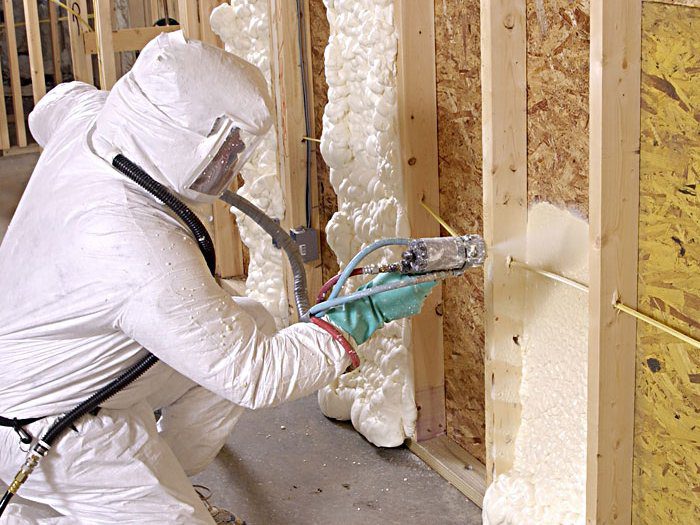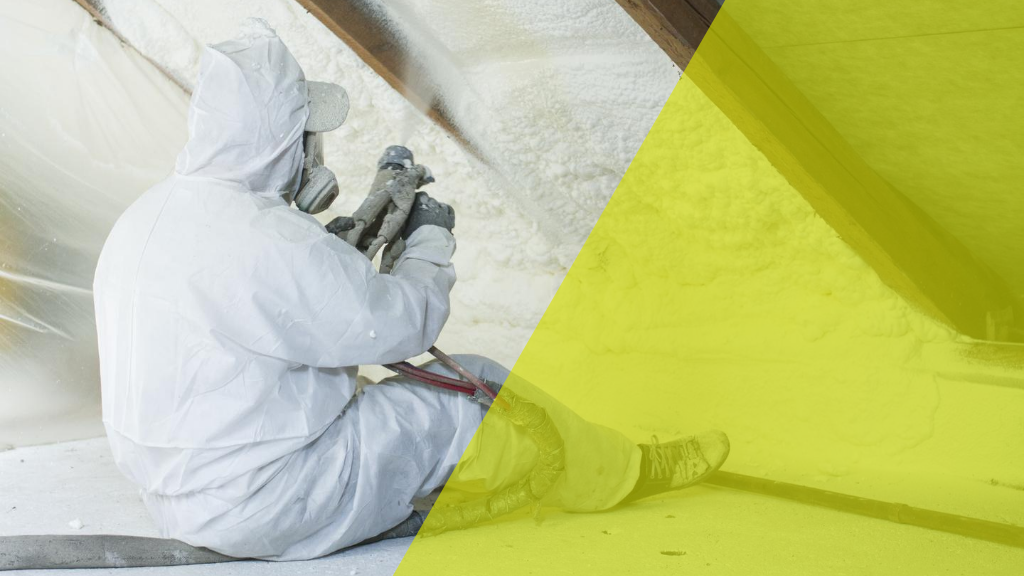How Spray Foam Can Improve Energy Effectiveness in your house
How Spray Foam Can Improve Energy Effectiveness in your house
Blog Article
Spray Foam: The Ultimate Service for Air Sealing and Insulation
Spray foam insulation has actually emerged as a leading service for efficient air securing and thermal insulation, using a special combination of homes that set it apart from traditional approaches. Its ability to expand and fill gaps makes it specifically effective in protecting against air leakage, which can significantly affect energy performance. Understanding the full scope of its benefits, installment procedures, and comparisons with various other insulation types is critical for making notified choices. As we explore these facets, the ramifications for both brand-new constructions and retrofits come to be progressively substantial. What variables should influence your choice?
What Is Spray Foam?
Spray foam is a functional insulation material that combines the concepts of air securing and thermal resistance to improve energy performance in structures. Composed mainly of polyurethane or other similar substances, spray foam is used as a fluid that broadens upon contact with surfaces, creating a solid, constant layer of insulation. This one-of-a-kind property allows it to load voids, splits, and gaps that typical insulation materials might neglect, providing a superior air seal.
There are 2 primary sorts of spray foam: open-cell and closed-cell. Open-cell spray foam is lighter and more flexible, offering exceptional audio absorption and a reduced R-value per inch - Spray Foam. In comparison, closed-cell spray foam is denser, supplying a greater R-value, moisture resistance, and added structural integrity to building parts
The application process commonly involves customized equipment, making certain a seamless application that sticks to various substratums, consisting of metal, concrete, and wood. This flexibility makes spray foam suitable for both brand-new constructions and retrofitting existing structures. Its capacity to create a closed barrier considerably adds to minimizing power intake and improving indoor air top quality, therefore making it a preferred selection among property owners and home builders alike.
Advantages of Spray Foam Insulation
Among one of the most considerable benefits of spray foam insulation is its exceptional ability to create a continual air obstacle, which successfully decreases energy loss. Unlike standard insulation products, spray foam expands to fill up splits and gaps, guaranteeing that air leak is dramatically decreased. This characteristic not only improves power efficiency but likewise results in lower utility bills in time.
Furthermore, spray foam insulation provides superior thermal resistance, adding to an extra secure interior atmosphere. Its high R-value per inch enables efficient insulation in confined spaces, making it optimal for attic rooms, walls, and crawl areas. Moreover, the moisture-resistant homes of spray foam assistance protect against mold and mildew and mildew growth, promoting much healthier living conditions.
An additional important advantage of spray foam insulation is its sound-dampening top qualities (Spray Foam). It successfully lowers sound transmission in between areas, developing a quieter and more comfy home environment. The durability of spray foam additionally sticks out, as it does not droop or work out over time, maintaining its efficiency throughout its life expectancy
Just How Spray Foam Works
Understanding exactly how spray foam insulation works is vital for valuing its efficiency in air sealing and thermal resistance. Spray foam insulation includes 2 key parts: isocyanate and polyol resin. When these parts are mixed, they go through a chemical reaction that causes the material to increase swiftly, producing a dense foam that loads splits, tooth cavities, and voids.
As the foam increases, it sticks to surfaces, creating an impermeable seal that substantially reduces air infiltration. This particular makes spray foam insulation very effective at protecting against drafts and wetness infiltration, which can bring about power loss and damages in time. Furthermore, the closed-cell variation of spray foam supplies superior thermal resistance because of its stiff framework, effectively minimizing warm transfer.
The special residential properties of spray foam allow it to comply with irregular surface areas, ensuring detailed protection and a seamless barrier. Consequently, spray foam insulation not just boosts power performance yet additionally adds to boosted interior air quality by reducing the accumulation of toxins and allergens. Eventually, understanding the auto mechanics behind spray foam highlights its role as a premium choice for insulation and air securing in both household and industrial applications.
Installment Process Introduction

Prior look at here now to setup, the room should be properly cleansed and prepped, guaranteeing that surface areas are devoid of wetness, particles, and dust. Because contaminants can compromise bond and general performance, this action is essential. When the area is prepared, the application includes blending the 2 parts of the spray foam, which increases upon contact and fills gaps efficiently.
Educated experts need to perform the installment, utilizing specialized devices to make certain uniform coverage and optimal thickness. Safety precautions, including putting on safety equipment and making certain correct air flow, are vital during this process. After application, the foam generally cures quickly, forming a strong obstacle that boosts energy effectiveness.
Comparing Spray Foam to Traditional Insulation
When assessing insulation options, this spray foam insulation stands out in comparison to typical products such as fiberglass and cellulose. Among the key benefits of spray foam is its premium air sealing capabilities. Unlike fiberglass and cellulose, which can permit air seepage, spray foam expands upon application, loading crevices and voids to create an airtight seal. This results in boosted power effectiveness, as less warmed or cooled down air leaves the home, causing lower utility costs.
In addition, spray foam provides a greater R-value per inch than typical insulation types, supplying even more effective thermal resistance in a thinner account. This particular is specifically beneficial precede with minimal cavity depth. Spray foam is resistant to wetness and mold growth, which can be a significant problem with cellulose and fiberglass, specifically in damp atmospheres.
Nevertheless, spray foam insulation commonly carries a greater ahead of time cost than its traditional equivalents. Home owners need to weigh this first investment against long-lasting energy financial savings and efficiency benefits. Inevitably, while both insulation kinds serve their objective, spray foam arises as an advanced solution YOURURL.com for contemporary insulation demands, particularly in terms of air sealing and thermal effectiveness.

Conclusion
In summary, spray foam insulation represents a highly effective solution for achieving optimum air sealing and thermal resistance. Its unique homes, including moisture resistance and sound dampening, make it suitable for numerous applications in both brand-new building and constructions and retrofitting projects (Spray Foam). The first expenses may be higher compared to conventional insulation products, the long-lasting benefits, such as significant energy savings and boosted indoor air quality, validate the financial investment and highlight its value in modern building practices.
Spray foam insulation has actually arised as a leading service for reliable air securing and thermal insulation, supplying an one-of-a-kind combination of homes that set it apart from conventional methods.Spray foam is a flexible insulation material that incorporates the principles of air securing and thermal resistance to improve power effectiveness in structures.When reviewing insulation options, spray foam insulation stands out in contrast to typical products such as fiberglass and cellulose. Eventually, while both insulation types offer their objective, spray foam arises as an extra innovative solution for modern insulation requirements, particularly in terms of air sealing and thermal efficiency.
In summary, spray foam insulation stands for a very efficient option for attaining optimum air securing and thermal resistance.
Report this page